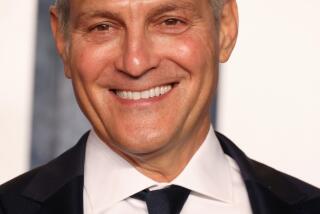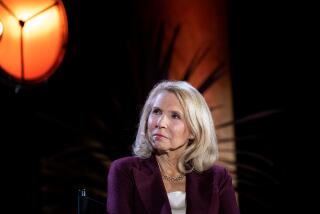A Change in Strategy for Vivendi’s Fourtou
- Share via
Throughout his career as a management consultant and pharmaceutical chief, Jean-Rene Fourtou developed a reputation as a single-minded executive skilled in rescuing troubled companies.
Then he met Vivendi Universal.
Fourtou, Vivendi’s chief executive, has learned the hard way that fixing the giant media company is more complex and daunting than anything he could have imagined when he ran Rhone-Poulenc in the late 1980s and 1990s. He is credited with turning the debt-ridden state-owned pharmaceutical company into one of the world’s largest and most profitable drug makers.
On Wednesday, Fourtou will hold a pivotal meeting in Paris with board members, after a three-month crash course in running an international media company. The immersion hasn’t been smooth.
The 63-year-old executive, who has no background in the media business, baffled analysts during a conference call last month when he was unable to answer basic questions about the company. He has perplexed employees and investors by sending mixed signals, telling employees of Boston publisher Houghton Mifflin, for example, that the publisher was not for sale only to reverse that position two weeks later. And Fourtou’s efforts to obtain a nearly $3-billion loan from creditors, although successfully concluded last week, took far longer than expected.
Above all, Fourtou’s optimism that he and the new management team quickly would outline a clear, long-term strategy for the future of Vivendi Universal proved quixotic. The meeting follows the July ouster of Jean-Marie Messier, whose two-year strategy to build a rival to AOL Time Warner Inc. left Vivendi with $30 billion in overall debt and a financial crisis.
“He [Fourtou] didn’t understand the constraints on his ability to call the shots,” said a source with close ties to the board. “He got out in front of himself. He’s a stranger in a strange land. It will take time. People want to know where his company is going.”
That basic question will be on the agenda Wednesday when Fourtou presents his game plan for the company. Although Fourtou declined to be interviewed, high-level sources within the company, investment bankers and analysts said they expect Fourtou to propose that Vivendi reduce its stake in the treasured French water business, possibly expand the company’s investment in French telecom company Cegetel and sell off Vivendi’s publishing assets. The plan keeps intact, at least for now, its U.S. entertainment businesses, including Universal Studios.
The strategy reflects an evolution in Fourtou’s thinking from just three months ago when the board plucked him out of retirement to rescue Vivendi.
The board cited his strong track record in restructuring troubled companies, his close ties to French banks and his reserved qualities that stand in marked contrast to the flamboyant Messier, whose love of the limelight and Hollywood offended the French business elite.
Fourtou’s original intent was to dismantle the media empire that Messier had built. The idea was to find a quick way out of Hollywood, a place where many French companies have failed, and to restore Vivendi to what it once was--a stodgy French water and sewage treatment company, sources close to Fourtou say.
That agenda was being pushed by Fourtou’s friend and fellow board member, Claude Bebear, the so-called godfather of French capitalism.Yet, on the face of it, Fourtou’s plan essentially preserves much of the media empire that Bebear and others lambasted. Some French pundits are even calling it a Messier strategy without Messier. The former CEO refuses to go quietly, and Monday he vowed to keep his seat on the company’s utility board.
However, few inside and outside the company believe that Fourtou has any long-term aspirations to be a player in the U.S. media business. Vivendi ultimately is expected to sell or spin off its U.S. entertainment businesses through a public offering, investors and board sources say.
“French shareholders will not support an American entertainment company and the American shareholders will not support a French company with French accounting,” said a source close to the board.
Although several parties, including John Malone’s Liberty Media Corp., Viacom Inc. and General Electric Co.’s NBC, have expressed interest in buying some of Vivendi’s U.S. assets, Fourtou is reluctant to sell any of the businesses at fire-sale prices in the current climate.
Another surprise for Fourtou was learning about the complexity of Vivendi’s $11-billion acquisition last year of the TV and film business of Barry Diller’s USA Networks. The terms of the deal and Diller’s stake in Vivendi Universal Entertainment make it difficult for Fourtou to make any decision on the future of the assets without Diller’s involvement. Diller, whose advisors are encouraging him to focus on his USA Interactive businesses, which include Ticketmaster, is in no hurry to make a deal, according to sources close to Diller.
Rather than standing in Fourtou’s way, however, Diller “has been trying to explain the business to Fourtou and emphasizing that these are good businesses,” said a source close to both men.
Another reason Fourtou is in no hurry to unload the U.S. entertainment assets is because Vivendi no longer is trying to raise cash quickly. Fourtou has concluded that he can meet his target of raising about $10 billion through sales of assets, such as Vivendi’s publishing unit, over the next two years. The approval last week of a nearly $3-billion loan also went a long way toward ending the company’s immediate cash crisis.
Fourtou’s willingness to change course reflects a characteristic pragmatism and independent streak that have been his trademark throughout his career.
The low-key manager is known as a careful, deliberate executive who weighs all the facts before making any decisions.
“He’s a very pragmatic fellow,” said Michel de Rosen, former CEO of a Rhone-Poulenc subsidiary. “He will eat his hat if he has to and he’ll acknowledge if he made a mistake.... Like all good CEOs, he wants to keep all his options open.”
Before coming to Vivendi, Fourtou was little known outside the insular world of the French business elite. “He’s not a guy the common citizen knows something about. He’s very discreet,” said Elie Cohen of the CNRS, a research institute in Paris.
At Rhone-Poulenc, Fourtou made a big push into the U.S. through several acquisitions, including Union Carbide Corp.’s agro-chemicals business and the Collegeville, Pa., pharmaceuticals group Rorer in 1990.
Fourtou also steered the successful 1999 merger with Hoechst of Germany to form pharmaceuticals giant Aventis. Fourtou, who initially was criticized in France for his role in the deal, worked hard to blend the Franco-German cultures to make the merger a success.
“He is not a Franco-centric manager,” Cohen said. “He made his career as a guy who imported American styles of management to France.”
Times staff writer Corie Brown contributed to this report.
*
(BEGIN TEXT OF INFOBOX)
French Twists and Turns
Vivendi Universal Chief Executive Jean-Rene Fourtou has sent some mixed signals during his first weeks on the job:
Hits
* Secured a critical $3-billion loan to cover cash shortfalls
* Stabilized stock price
* Solicited buyers for the company’s less-profitable assets
Misses
* Puzzled analysts with his inability to answer basic questions about the company
* Miscommunicated with investors when he flip-flopped on whether Vivendi would sell its textbook publishing unit
* Has not provided a detailed, long-term strategy
More to Read
Inside the business of entertainment
The Wide Shot brings you news, analysis and insights on everything from streaming wars to production — and what it all means for the future.
You may occasionally receive promotional content from the Los Angeles Times.











